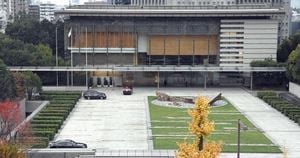Bart Verhaeghe, the chairman of Club Brugge, has come under fire for his confrontational behavior following his team's surprising loss to Standard Liège this past weekend. After Club Brugge succumbed to a 1-2 defeat, Verhaeghe took it upon himself to seek out referee Lawrence Visser, expressing his discontent over what he deemed unfair officiation during the match.
The match had begun promisingly for Club Brugge, with Ferran Jutgla breaking the deadlock shortly after halftime. Unfortunately, things quickly turned sour when teammate Christos Tzolis received a questionable double yellow card, leading to his dismissal. With just ten men on the field, the dynamics shifted dramatically and Standard Liège equalized through Andi Zeqiri's penalty before Dennis Eckert Ayensa sealed the victory.
Post-match, Verhaeghe's anger boiled over as he confronted referee Visser in the player tunnel, offering him what many have classified as unwarranted personal criticism. Former referee Serge Gumienny remarked on this action, stating, "De reactie van Verhaeghe vond ik ongelukkig. Iemand met zijn macht en status zou zoiets aan zich voorbij moeten laten gaan," which translates to, "I found Verhaeghe's response unfortunate. Someone with his power and status should let such things pass by." This sentiment reflects the broader criticism directed at Verhaeghe’s decision to wait for the referee, which many deemed inappropriate and unprofessional.
Ludo Vandewalle, the chief football editor for Het Nieuwsblad, echoed similar concerns, saying, "Het geeft het imago van de Club-voorzitter een deuk en is voer voor insinuaties," meaning, "It gives the image of the club chairman a dent and is food for insinuations." Vandewalle warns of the impact such public displays can have on Verhaeghe’s reputation—a figure already under scrutiny for the club's previous successes, which he has helped orchestrate over the last decade.
Verhaeghe's actions were interpreted as detrimental not only to his image but also to the broader perception of leadership within the league. Vandewalle expressed concern saying, "Op zo'n momenten moet Verhaeghe de druk weghouden bij iedereen van Club Brugge," meaning, "At such moments, Verhaeghe needs to relieve the pressure from everyone at Club Brugge." The underlying message is clear; for someone at the helm of such a prestigious football club, it is imperative to maintain composure and professionalism, especially after contentious matches.
This incident has sparked widespread discussions on social media and among fans and pundits alike, debating the appropriateness of such confrontations between club officials and referees. Supporters of Verhaeghe argue he was merely defending his club's interests, but many others perceive it as crossing the line.
Before this latest drama, Club Brugge has been enjoying notable success, recently securing qualification for the knockout stages of the UEFA Champions League, thereby solidifying their status as one of Belgium's top football clubs. This escalation, particularly following such achievements, raises questions about the pressure faced by leaders like Verhaeghe and the fine line they navigate between passion and professionalism.
While passionate engagement is often celebrated in sports, figures like Verhaeghe need to balance personal emotion with the responsibilities their roles entail, particularly when dealing with officials. The fallout from this incident may serve as both a lesson and cautionary tale for Verhaeghe and other club leaders moving forward.
Supporters and analysts alike will be closely watching how this situation evolves and whether it will impact Verhaeghe's position within the club or the broader perception of Club Brugge as they strive to regain their footing after this frustrating loss.
Only time will tell if Bart Verhaeghe can navigate this controversy without permanent damage to his reputation or the club's standing within both national and international football communities.



